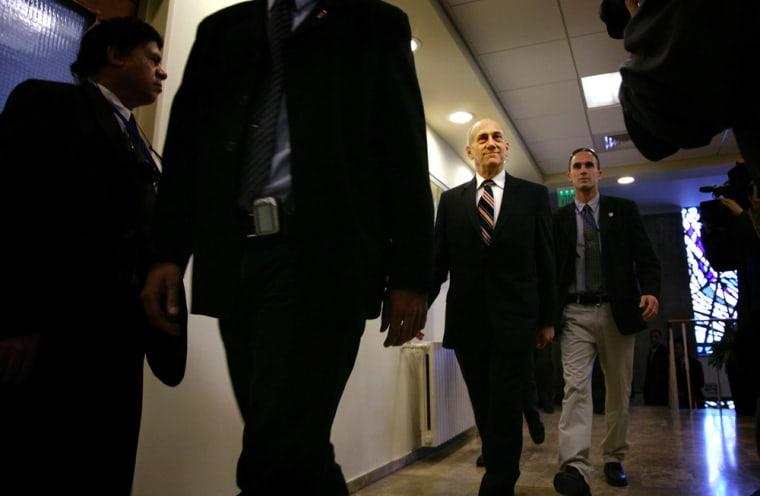Prime Minister Ehud Olmert on Sunday ruled out peace talks with the Palestinians, saying contacts will be limited to humanitarian issues until the new coalition government explicitly renounces violence and recognizes Israel’s right to exist.
Speaking at the weekly meeting of his Cabinet, Olmert said he would boycott the new government and urged the international community to follow suit. The Cabinet overwhelmingly endorsed Olmert’s position.
The rival Palestinian factions Hamas and Fatah installed their new unity government on Saturday, hoping the alliance will end months of infighting and persuade the international community to lift a year of economic sanctions.
Israeli officials fear the new government will cause the tough international stance against the Palestinians to crumble. Israel and the U.S. on Sunday ruled out a resumption of financial transfers to the Palestinians. But Norway announced it would lift sanctions, and Britain and the U.N. also signaled flexibility.
While the coalition’s platform is more moderate than that of the previous Hamas-led government, Olmert said it fell short of international demands to renounce violence, recognize Israel and accept past peace deals. He also noted its affirmation of the right to “resistance.”
“This is a government that does not accept the conditions of the international community and sees terror as a legitimate goal,” Olmert told his Cabinet.
Olmert said he would maintain contact with the moderate Palestinian president, Mahmoud Abbas, who was elected separately and is not a member of the coalition government. But Olmert said the discussions would be limited to “quality of life” issues for Palestinians.
The Cabinet endorsed Olmert’s position 19-2, Israeli radio stations reported.
Arab moderates back unity body
Arab leaders pledged support on Sunday for the unity government.
“We should support this government and reject the embargo imposed on the Palestinian people, which is at the top of the (Arab summit) agenda,” said Amr Moussa, secretary general of the Arab League, on Sunday after meeting with Egyptian President Hosni Mubarak in Cairo.
The new Palestinian administration replaced a year-old government led by Hamas, the Islamic militant group that has killed dozens of Israelis in suicide bombings. It capped months of negotiations — interrupted by bursts of violence that killed more than 140 Palestinians — between Hamas and Fatah.
Hamas’ rise to power last year provoked Western donor nations to cut off aid to the Palestinians. Israel also has withheld hundreds of millions of dollars in taxes it collects for the Palestinians. The sanctions have devastated the Palestinian economy.
Finance Minister Salam Fayyad warned Saturday that the new government would not be able to function for long unless the boycott is lifted and financial aid is increased.
At Saturday’s parliamentary swearing-in ceremony, Palestinian leaders sent mixed messages about their dealings with Israel. But in sum, they appeared to show a softening of Hamas’ stance.
U.S. opens door for talks
Micaela Schweitzer-Bluhm, spokeswoman for the U.S. Consulate in Jerusalem, said Prime Minister Ismail Haniyeh of Hamas had missed an opportunity to accept the international conditions and make the Palestinians a “partner for peace.”
But in a break from the Israelis, she said the U.S. would likely maintain contact with non-Hamas members of the government.
The new Palestinian alliance appears to implicitly recognize Israel by calling for a Palestinian state on lands the Israelis captured in 1967, in contrast with Hamas’ past calls to eliminate Israel altogether.
It also pledges to “respect” previous agreements with Israel and authorizes Abbas to conduct future peace talks. Any future deal would be submitted to a national referendum, suggesting Hamas would not hold veto power.
Abbas, who has repeatedly condemned violence and called for peace talks with Israel, has said the deal is the best he can get from Hamas and was needed to avert Palestinian civil war.
“We hope the world community, especially the U.S. and Israel, will deal with this government,” Nabil Abu Rdeneh, a top aide to Abbas, said Sunday. “This is the only opportunity for peace and stability so far.”
Unity government job no. 1: ‘Palestinian state’
Presenting the government’s program to parliament Saturday, Haniyeh said the alliance would work “first and foremost to establish an independent Palestinian state,” with disputed Jerusalem as its capital, on lands Israel occupied in the 1967 Mideast War.
He said the Palestinians maintained the right to resist occupation, but would also seek to widen a truce with Israel, now limited to the Gaza Strip.
On Sunday, however, Hamas issued a statement saying the government platform “is totally different than the program of the Hamas movement.”
“We call on the national unity government to support the choice of resistance against the occupation,” the statement said.
In addition to the struggle for international legitimacy, the Palestinian alliance also is in danger of crumbling quickly over ideological differences, and long-standing enmities between the two factions and their legions of gunmen.
Abbas on Sunday named a Gaza strongman known for leading a crackdown on Hamas militants a decade ago as his national security adviser, presidential aides said.
The appointment puts Mohammed Dahlan, a top official in Abbas’ Fatah party, in a sensitive position as Palestinian leaders try to reform their myriad and competing security services. Hamas still has rocky relations with Dahlan.
